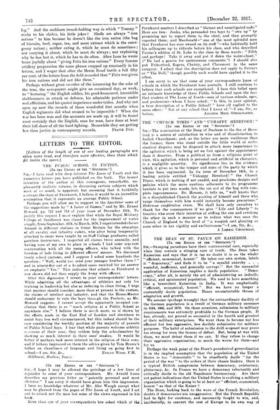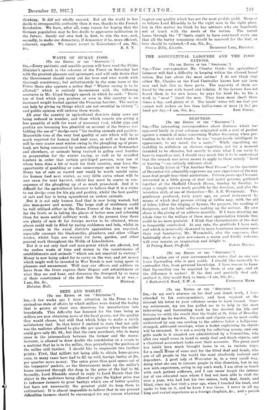THE DEAN OF ST. PAUL'S ON KAISERISAL (To rat Emma
or Stotcrarmi."3 •
SIE,—Sweeping paradoxes have their controversial uses, especially when they contain a stinging core of truth. The Dean takes Kaiserism and says that it is (as no doubt it is on the whole) " efficient, economical, honest." He takes our own system, labels it " democracy," and finds it to be " a squalid anarchy . . . wasteful, inefficient, and generally corrupt." But the successful application of Kaiserism implies a docile population. Demo- cracy," after all, is merely the art of administering an indocile, critical, and opinionated population. We used to have something like a benevolent Kaiserism in India. It was emphatically "efficient, economical,- honest." But we have no longer a contentedly docile population. Hence uncomfortable throes of adaptation and growth.
We assume (perhaps wrongly) that the extraordinary docility of the German population is a result of German military successes in 1884, 1866, and 1870. On those occasions, submission to military requirements was extremely profitable to the German people. It has, already, not proved so successful in the fourth and greatest of their military enterprises. We want them to become not less efficient but less aggressive, less docilely submissive for military purposes. The habit of submission to the drill sergeant may prove too strong for even the lessons of defeat. But, being at war with them, we must defeat them if we can. If they refuse to change their aggressive organisation, so much the worse for them—and for us.
Perhaps the weak point of the Dean's paradoxical generalization is in the implied assumption that the population of the 'United States is too " democratic" to be steadfastly docile "for the period of the war " to the orders of their chosen leaders. Ours Is a typical British compromise between democracy, aristocracy. plutocracy, die. In France we have a democracy reluctantly and critically docile to the old Napoleonic bureaucracy. Are there not patent indications that the United States is evolving a military organisation which is going to be at least as " efficient, economical, honest " as that of the Kaiser P
The Dean, looking back to the wars of the French Revolution, doubts if democracies'are unaggressive.' But the French Republic had to fight for existence, and necessarily fought to win, and, incidentally, to convert the rest of Europe to its own way of thinking. It did not wholly succeed. But all the world is less docile to irresponsible authority than it was, thanks to the French Revolution. We have, after all, some reason for hoping that the German population may be less docile to aggressive militarism in the future. Surely our own task is, first, to win the war, and, secondly, to make our democracy, if democracy it be, more efficient, coherent, capable. We cannot revert to Naiserisms.—I am, Sir,



























 Previous page
Previous page